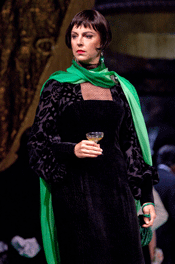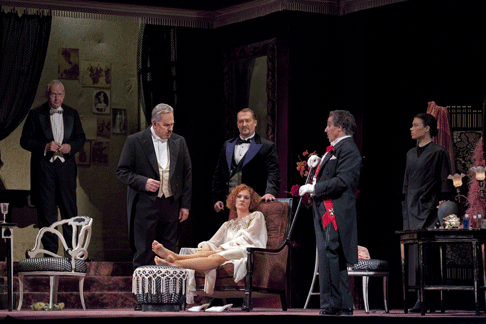This came
home painfully five minutes before the performance ended, at the tense moment
when the humiliated Lulu entreats her latest client, a black-bag-toting
Englishman named Jack, into her bedroom. Somebody’s watch began to beep
and kept on beeping. Happily, the music at this point is pretty loud, depicting
what Jack is doing to Lulu just off stage, and Fabio Luisi let it out and
drowned the beeping.
Nothing given at the Met this not-very-triumphant year (with the possible
exceptions of The Nose, From the House of the Dead and
Ariadne auf Naxos) has been of the across-the-board excellence,
brilliantly sung, flawlessly acted, sublimely played, appropriately staged, of
this Lulu. This fact brings to mind questions: Why does Lulu
– seldom a crowd-pleaser (though the house was packed for the performance
I attended, all enthusiastic) – merit this level of care from the Met
while such more traditional fare as Aida or Turandot or
Der Fliegende Holländer or Tosca are allowed to sink or swim,
survive on lingering reputation, the staging haphazard, the singing mediocre?
Is it because Lulu, being notoriously difficult, gets extra attention?
Is it because the Met cannot find anyone capable of singing Aida or Radames or
Turandot, but can easily come up with Lulu and Dr. Schön? It’s difficult
to believe a Lulu of the caliber of Marlis Petersen is to be found on every
street corner of the opera world, and if she has been located and lured to the
Met, why has there been hardly a decent Aida in decades? The
production is there, and Great Isis knows the audience is there, eager to hear
it.
 Anne Sofie von Otter as Countess Geschwitz
Anne Sofie von Otter as Countess Geschwitz
Well, enough about Aida: this was a Lulu to remember. John
Dexter’s handsome thirty-year-old Jugendstil production, with its
Austro-Hungarian curlicues, its air of Klimt-Schiele decadence, is still
handsome enough to satisfy. The direction was largely appropriate, though
characters occasionally sing of going out of doors when in fact they are
climbing the staircase to an upper floor. Lulu behaved as if on a different
wavelength from that of the men – and women – obsessed with her,
and that is as it should be: she is their idol, their destroyer, their
plaything, their posession. No one ever sees her as human, including Lulu
herself, and when she does show signs of humanity, it’s far too late.
In a cast giving exceptional performances across the board, even in such
minuscule roles as the pimp who tries to blackmail Lulu into entering a brothel
in Cairo in Act III – Graham Clark, sinister and funny, as he was also as
Lulu’s butler in Act II – and the pageboy who obligingly changes
clothes with Lulu, allowing her to escape the pimp – Ginger
Costa-Jackson, who manages the trick of looking and moving like a boy
uncomfortably in drag – the star of the evening, besides Marlis
Petersen’s Lulu, was Fabio Luisi, recently announced as the Met’s
visiting music director, who once again demonstrated that his control, his
musicianship, his dramatic flair rank every him every way as worthy as James
Levine. This was a taut, elegant, alive performance. There was time to notice
such witty details as the concertato in the final scene of Act I – when
the various men in Lulu’s life savage each other vocally in an atonal
parody of a bel canto sextet, while Lulu, the only treble voice on stage, seems
to pay no attention to them.
Petersen, the vocal star of the Met’s Hamlet this spring,
wherein she sang the most old-fashioned of suicidal mad scenes in a luscious,
gratifying manner, might almost be another singer when she sings Lulu. Mind
you, the part could hardly be farther from bel canto Ophélie – it is all
Sprechstimme, high-flying taunting, snarling, giggling, dreaming phrases
pointed here and there on the scale, all of them produced with dramatic intent.
Lulu, the child of nature, is no sensualist like Carmen or Musetta: she likes
the physicality of sex. She does not develop a soul, a self, until she becomes
desperate in Act III, having lost her money, her husbands, her position, almost
her freedom. The transformation in Peteren’s vocal delivery in this act
was matched by her movements; her entire figure seemed that of another woman,
yearning no longer for sex but for death – the equal and opposite urge,
as Freud might have suggested to Berg, his contemporary.
 A scene from Act I with James Courtney as the Theater Manager, James Morris as Dr. Schön, Marlis Petersen in the title role, Gary Lehman as Alwa, Graham Clark as the Prince, and Ginger Costa-Jackson as Wardrobe Mistress
A scene from Act I with James Courtney as the Theater Manager, James Morris as Dr. Schön, Marlis Petersen in the title role, Gary Lehman as Alwa, Graham Clark as the Prince, and Ginger Costa-Jackson as Wardrobe Mistress
James Morris seemed on the ropes when he sang Claudius in Hamlet, his voice
dry and tending towards wobble. As Dr. Schön, Lulu’s most possessive
possessor, he sang with authority and irony. Each syllable was acted, and each
sung note had a degree of menace and self-loathing. A very classy act.
Anne-Sofie von Otter, whom I have found dull in more conventional parts, sang a
most affecting Countess Geschwitz. Gary Lehman was stocky but sympathetic as
Alwa Schön. Bradley Garvin brought particular menace not only to his movements
but to each phrase of his vigorous baritone as the Acrobat. It was a cast
without a flaw, a Lulu to remember forever, the new standard.
John Yohalem
![Marlis Petersen as Lulu [Photo by Ken Howard courtesy of Metropolitan Opera]](http://www.operatoday.com/Petersen_Lulu.gif)

